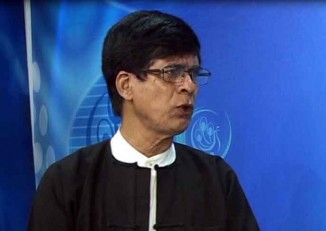Several prominent voices in Burma have criticised the arrest and detention of three journalists and three civilians in Shan State earlier this week.
Renowned human rights lawyer Robert San Aung said it would appear that the authorities violated Section 376 of the constitution, which states that “no person shall be held in custody for more than 24 hours without being remanded by a competent magistrate.”
Nyan Win, a spokesperson for the ruling National League for Democracy (NLD), told DVB that the Burmese army had no right to arrest the journalists and civilians, and that holding them in detention for more than 24 hour was not in line with human rights standards.
“The accused should have certain rights in accordance with the law,” he said on Thursday. “And one of those is that he or she cannot be cut off from all contact.”
Shwe Mann, the chairperson of the Commission for the Assessment of Legal Affairs and Special Issues, said that if the relative media organisations submit a case it will investigate it.
“After we consider the case, we will send our recommendations to the relevant ministry,” he said.
[related]
Meanwhile, the Myanmar Press Council said it requested the military to release the journalists on Tuesday and is still awaiting a response.
Aung Hla Tun, vice chairman of Myanmar Press Council, said, “We have done our job. According to the law, we cannot do any more.”
DVB reporters Aye Nai and Pyae Bone Aung, The Irrawaddy’s Lawi Weng, and four civilians were detained by the Burmese army while returning from Palaung territory on 26 June. One civilian, the truck driver, has since been released.
The others were charged under Section 17(1) of the Unlawful Associations act, implying that they were consorting with Palaung rebels.
In recent years, several Burmese journalists have faced charges under Article 66 (d) of the Telecommunications Act, which covers libel and defamation, but which critics say is frequently used to silence dissent.
Local and international civil society organisations (CSOs) called today for Article 66(d) to be repealed.
In a joint statement, 62 CSOs said that “serious questions” would be raised about the government’s commitment to freedom of expression if it fails to repeal Article 66(d) in line with international human rights laws and standards.
“It would also undermine the government’s reform and responsible business agenda, by chilling or even silencing the ability of the public and journalists to report on public sector mismanagement, harmful and illegal business practices, and corruption,” said the joint statement.



